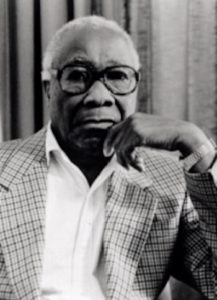
Govan Mbeki
*Govan Mbeki was born on this date in 1910. He was a Black South African politician, journalist, Communist, and activist.
Govan Archibald Mvuyelwa Mbeki, who belongs to the Xhosa ethnic group, was born in the Nqamakwe district of the Transkei region. He was the son of Chief Sikelewu Mbeki and Johanna Mahala and the father of the former South African president Thabo Mbeki and political economist Moeletsi Mbeki. As a teenager, Mbeki worked as a newsboy and messenger in the cities, and because of this, he saw the poverty urban black Africans lived in and the constant police raids they endured.
He attended Fort Hare University, completing 1936 a Bachelor of Arts degree in politics and psychology and a teaching diploma. Mbeki met other African struggle leaders while attending the university. For a time, Mbeki taught but lost his job because of his political activities. He was a member of the South African Communist Party (SACP, then the Communist Party of South Africa, or CPSA) from the late 1930s and joined the African National Congress in 1935. He established a cooperative store in Idutywa and began a writing career. From 1938 to 1944, he was the editor of Territorial Magazine / Inkundla Ya Bantu.
Mbeki left journalism in 1944 and became a government-nominated Transkei Territorial Authorities General Council member until 1950. His role in the CPSA/ SACP was clandestine then, so he was nominated. Mbeki disparagingly referred to the council as a 'toy telephone: "You can say what you like, but your words have no effect because the wires are not connected to an exchange." In 1948, Mbeki was a candidate for the Natives Representative Council but lost the election. When the CPSA/ SACP was banned in 1950 by the apartheid government, Mbeki remained in the African National Congress (ANC).
In 1952, Mbeki was imprisoned with Raymond Mhlaba and Vuyisile Mini for three months in Rooi Hel ('Red Hell' or North End Prison, Port Elizabeth) for disobeying apartheid laws by participating in the 'Campaign of Defiance against Injustice Laws' (Defiance Campaign). In 1954, a tornado destroyed his store, and Mbeki was dismissed from teaching again (he would lose his job three times and be blacklisted from others from the 1930s onwards). Mbeki moved to Port Elizabeth and joined the editorial board of New Age, a prominent leftist newspaper linked to underground CPSA/ SACP networks. He played a crucial role in ensuring that the pages and columns reflected Black working-class Africans' conditions, demands, and aspirations, particularly in the countryside. He also produced the newsletter Izwe Lomzi ("Voice of the People").
Mbeki was meanwhile actively involved in the major campaigns of the day, including the revival of the African National Congress in the 1940s, the Defiance Campaign, and the Congress of the People. He was sent to prison in 1963 as a defendant in the Rivonia Trial. Mbeki was released from custody after serving 24 years in the Robben Island prison on November 5, 1987. He served in South Africa's post-apartheid Senate from 1994 to 1997 as Deputy President of the Senate and then the Senate's successor, the National Council of Provinces, from 1997 to 1999.
Govan Mbeki died in Port Elizabeth on August 30, 2001. He was given a state funeral during his son's presidency on September 8, 2001. His remains were controversial in 2006 when plans were made to exhume them and place them in a museum. These plans were called off after Mbeki's family refused the request.